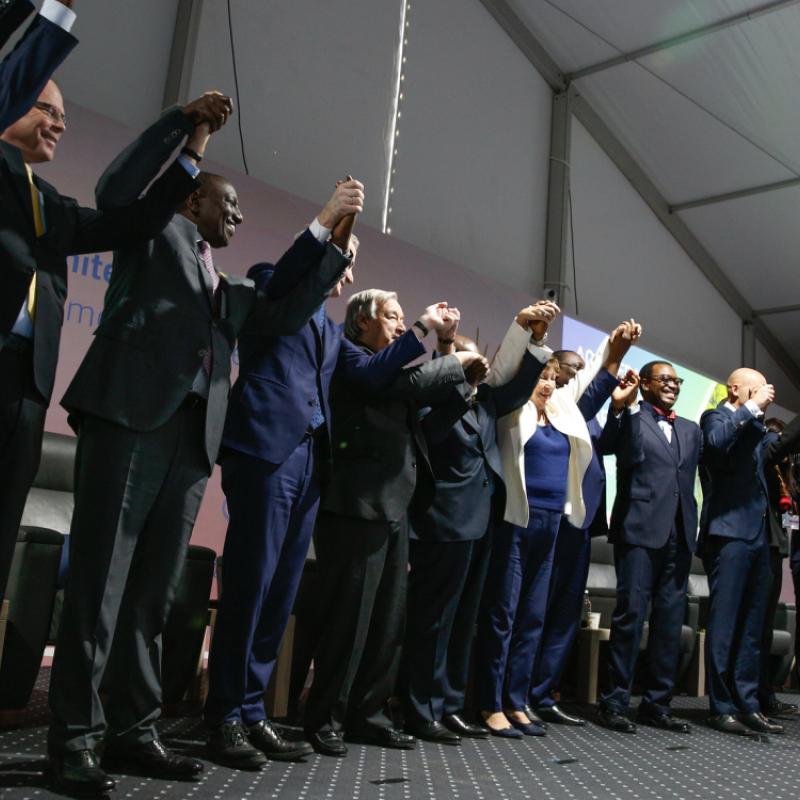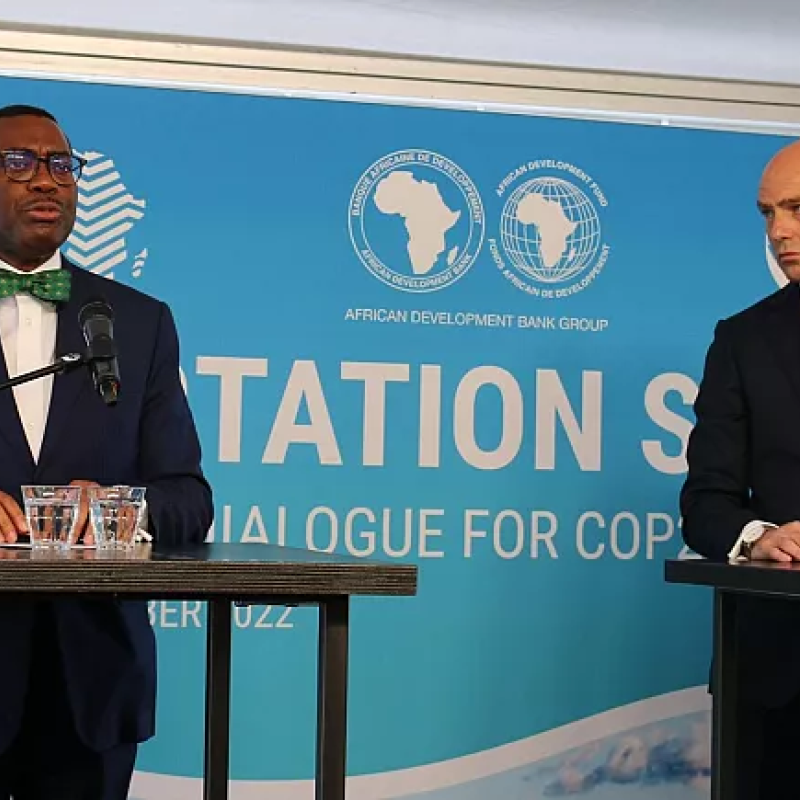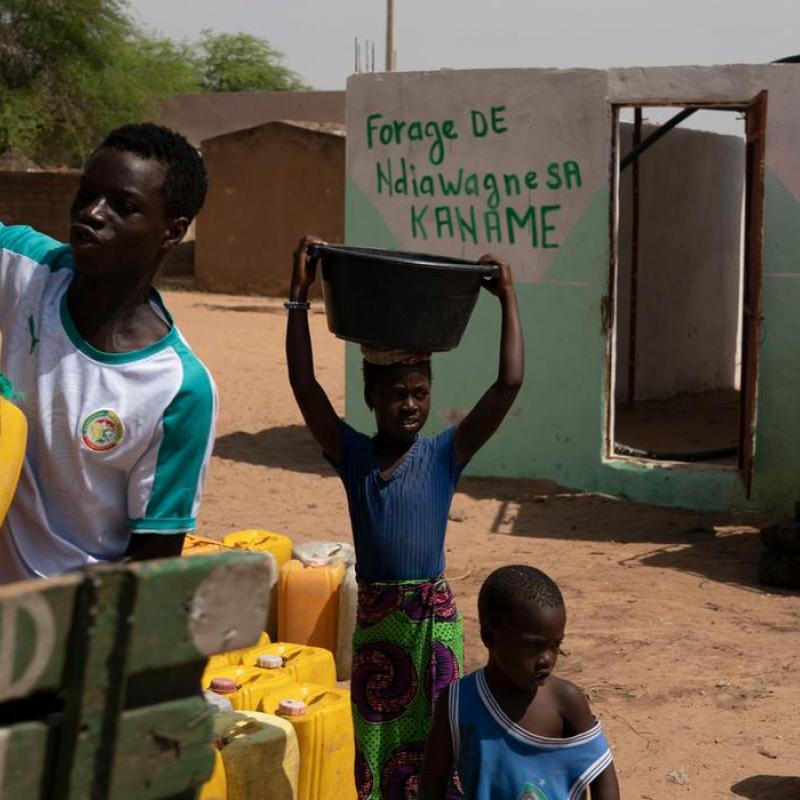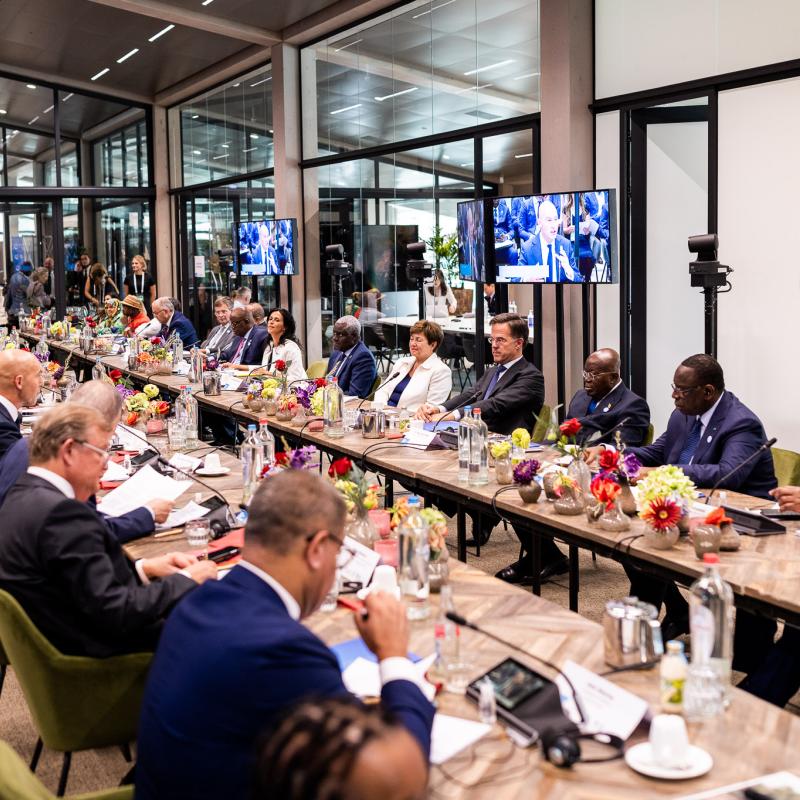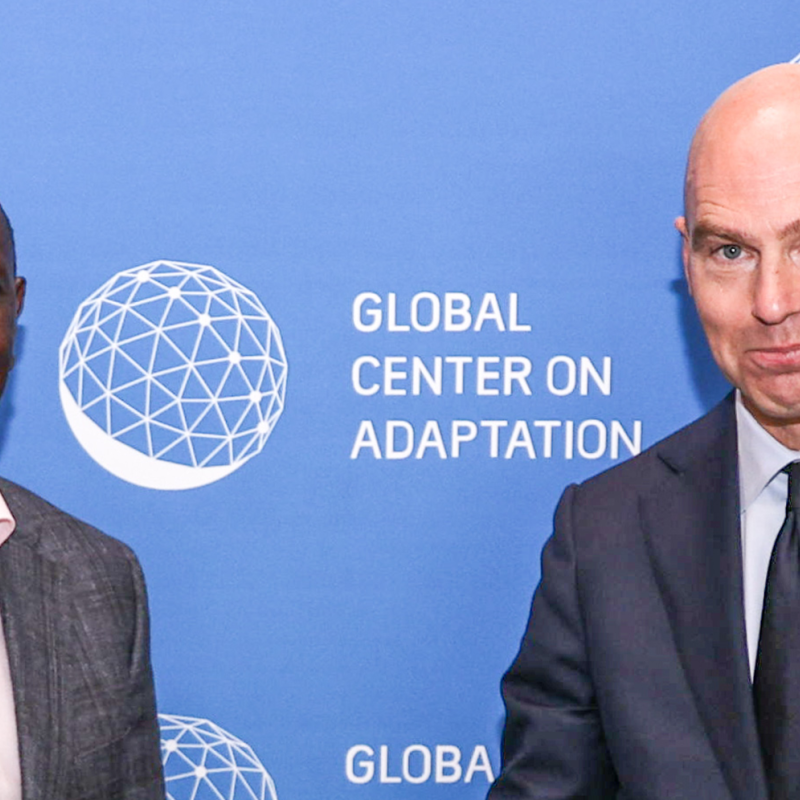
AAAP in the Media
Displaying 1 - 12 of 13
AAAP webinar: Innovation essential for climate-smart future, but it's not enough
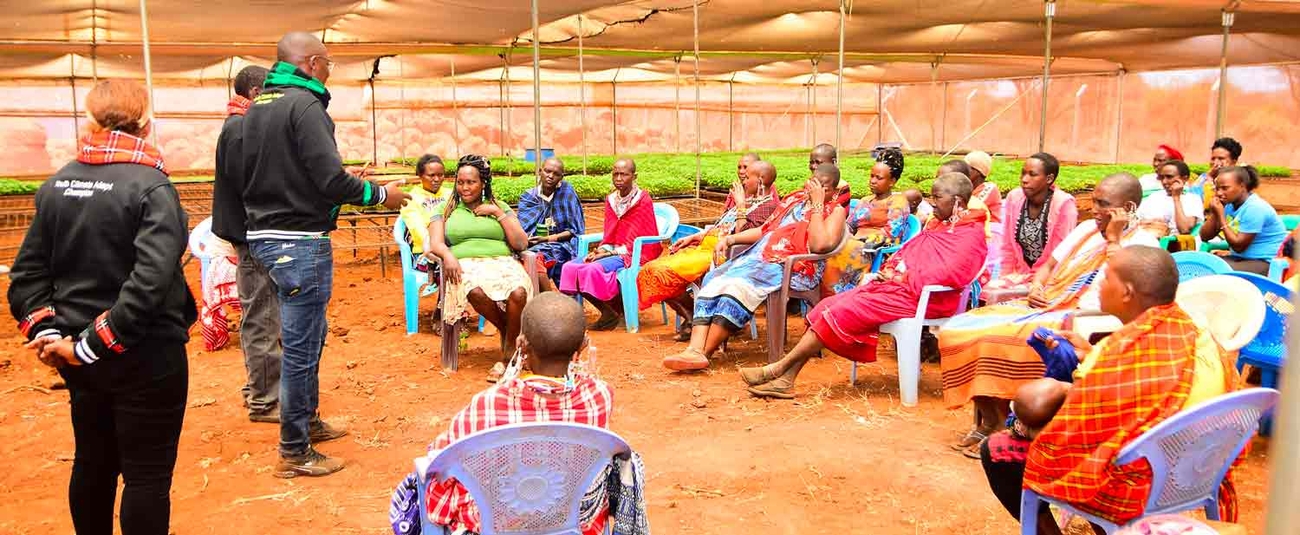
The 2022 United Nations Climate Change Conference, COP27, is dubbed ‘African COP’ as the impact of climate change on African countries will be a key theme of discussions. Agriculture and food systems will also be a critical focus of COP27, with Saturday, 12 November, dedicated to both themes, in addition to adaptation. Also high on the climate agenda is the role of the youth, as 10 November is dedicated to their participation.
Ahead of COP27 and in line with their commitment to this youth agenda, the African Development Bank and the Global Center on Adaptation hosted a webinar to examine ways to make agriculture attractive to the youth.
The webinar titled, Are Climate-Smart and Digital Agriculture Solutions the Silver Bullet to Attract Youth, highlighted the potential of climate-smart and digital agriculture in attracting young people and thereby rejuvenating an aging global agricultural sector.
Dr. Kevin Kariuki, African Development Bank’s Vice President for Power Energy, Climate and Green Growth, pointed out the challenges the agriculture sector faces due to the changing climate change.
“Agriculture across most of sub-Saharan Africa is still predominantly rain-fed and therefore extremely vulnerable to both short-term fluctuations and long-term changes in climate conditions. It is the most exposed sector with estimates indicating that climate change will cause a decrease in yields of 8 – 22% for Africa’s rain-fed staple crops over the next 20 years,” Kariuki said.
Dr. Beth Dunford, African Development Bank’s Vice President for Agriculture, Human and Social Development, noted that while agriculture holds tremendous potential for job creation in Africa, its current traditional form is not attractive to young people for various reasons, including negative perceptions.
“Who wants to wear overalls, dig the field with a hoe or drive a tractor when we can do it in a suit and dust coat, right? However, technology makes agriculture cool enough to motivate them to use tech-enabled enterprises to be part of agricultural value chains,” Dunford said.
Prof. Anthony Nyong, Senior Director for Africa at the Global Centre on Adaptation, said: “There is a gap in the agriculture sector in Africa, and that is in the use of digital solutions.”
AAAP’s Climate Smart Digital Technologies for Agriculture and Food Security Pillar is scaling up access to digital technologies and associated data-driven agricultural and financial services for at least 30 million African farmers.
In the African Development Bank’s Program to Build Resilience for Food and Nutrition Security in the Horn of Africa (BREFONS), currently ongoing in Djibouti, Ethiopia, Kenya, Somalia, South Sudan, and Sudan, the AAAP is facilitating the integration of climate-smart digital technologies for adaptation and resilience.
“The project will increase the productivity of crops and livestock by 30%, reaching about 1.3 million farmers and pastoralists using climate services such as index insurance. About 55,000 additional jobs will be created for youth and women,” said Oluyede Ajayi, Africa Program Lead, Food Security and Rural Well Being, Global Centre on Adaptation.
Panelists said the youth must utilize their digital skills to accelerate the transformation of the agricultural sector, which forms the central pillar of Africa’s economy. They urged participants to contribute to solutions that enhance market linkages to promote agribusiness.
“Africa’s significant youth population faces rising unemployment with myriad negative consequences. These challenges are further exacerbated by climate shocks, skill gaps & limited preparedness to address the effects of climate change,” said Andre-Marie Taptue, Principal Economist at the African Development Bank's Jobs for Youth program.
AAAP’s YouthAdapt program promotes sustainable job creation through entrepreneurship in climate adaptation and resilience in Africa by unlocking $3 billion in credit for adaptation action.
Last year, the first set of ten young African entrepreneurs and Micro, Small, and Medium-sized Enterprises offering innovative solutions and business ideas that can drive climate change adaptation and resilience were awarded at COP26 in Glasgow. This year the Africa Youth Adaptation Competition 20 enterprises across Africa will each receive up to $100,000 in addition to mentorship and coaching to support their climate change adaptation innovation.
Panelists included Claude Migisha from the African Development Bank, Dr. Fleur Wouterse, and Aramide Abe from the Global Center of Adaptation. They shared their views on how AAAP was shaping and adding value to the Bank Digital Agriculture Flagship program, ways to accelerate investor engagement in agriculture adaptation, and how the YouthADAPT was moving the needle on entrepreneurship, unlocking finance and job creation.
Gislaine Matiedje Nkenmayi from Mumita Holdings, a recipient of the 2021 YouthADAPT Challenge award, shared her experience on how the $100,000 grant transformed her enterprise.
“With the grant, we were able to reach out to more than 10 cooperatives with a total of 257 smallholder farmers, to whom we offer free advisory services, low-cost greenhouses and solar-powered irrigation systems. We have been able to expand production from 100kg to 1000kg of fresh vegetables weekly,” Nkenmayi said.
In her concluding remarks, Edith Ofwona Adera, Principal Regional Climate Change Officer and AAAP coordinator at the Bank stressed the need to strengthen adaptation and resilience measures and expedite mainstreaming climate adaptation for transformation at scale. She called for the engagement of the private sector, given the role they can play in adapting to climate change, financing adaptation, and supporting others through products and services for resilience.
Building resilience for food and nutrition security in the Horn of Africa (BREFONS)
The target countries of this project (Djibouti, Ethiopia, Kenya, Somalia, South Sudan, and Sudan) are located in the arid and semi-arid lands, which comprise more than 70% of the Horn of Africa (HOA) region, receive less than 600 mm of annual rainfall and are characterized by recurrent droughts and unpredictable rainfall patterns.
Despite the region’s considerable range of natural resources, with their huge potential for wealth and progress, the HOA countries are struggling to cope with their worsening ecological circumstances. Droughts are increasing in severity and frequency and their impacts are exacerbated by advancing desertification, land degradation, global warming, and climate change. These circumstances have created chronic vulnerability in the HOA, with persistent food insecurity, widespread economic hardships, conflicts, and migration. The strategic priorities of countries in the HOA are defined by their urgent need to build resilience to environmental and socio-economic shocks, through investing in sustainable development and optimizing the productivity of their resources.
Through building resilience to climate change, the overall objective of this program is to increasing, on a sustainable and resilient basis, productivity and agro-sylvo-pastoral production in the HOA, increase incomes from agro-sylvo-pastoral value chains and enhance the adaptive capacity of the populations to prepare for and manage climate change risks.
- Provide upstream technical assistance to ensure climate smart digital technologies for adaptation and resilience are integrated into the project.
- Identifying key agriculture adaptation constraints that can be addressed by digital technologies and develop solutions
- Assessing the conditions and opportunities for digital applications for drought index insurance
- Identifying opportunities for digital agricultural adaptation solutions through the preparing of climate risk and digital agriculture profiles
- Supporting stakeholders to identify and implement opportunities through the preparation of a digital agricultural adaptation toolkit
- Building the capacity of policymakers and enable policy interventions to ensure uptake of digital solutions using the toolkit.
- Feasibility studies and assessment on building resilience for food security in Africa;
- Feasibility studies to assess integration of adaptation and mitigation measures for the sustainability of nutrition and food security interventions;
- Quality assurance and advisory services for results and evidence-based planning, management and M&E of the Youth Enterprise Development project interventions
The programme will contribute to improving living conditions, including for women and the youth; improving food and nutrition security; increasing resilience; and peace and security in the HOA. Specifically it will:
- Productivity (crops and livestock) increased by 30%
- 50% increase in digital literacy for actors across value chains, of which 80% are women and youth
- 30% de-risked credit as a result of use of Digital Climate Advisory Services and Digital Financial Services
- 30% increase in use of index insurance products by smallholders across target value chains
- 55,000 additional jobs created (primarily for women and youth)
- 1.3 million farmers and pastoralists in the six countries use climate services (e.g. index insurance with a gender focus), allowing them to benefit from:
- Increased productivity and agro-sylvo-pastoral production in the Horn of Africa, on a sustainable and resilient basis
- Increased incomes (by 40%) from agro-sylvo-pastoral value chains
- More broadly, the population of the Horn of Africa have enhanced adaptive capacity to better prepare for and manage climate change risks and variation.
USD 210 million
Global Leaders Rally Support and Finance for the Africa Adaptation Acceleration Program to Tackle Climate Change in Africa
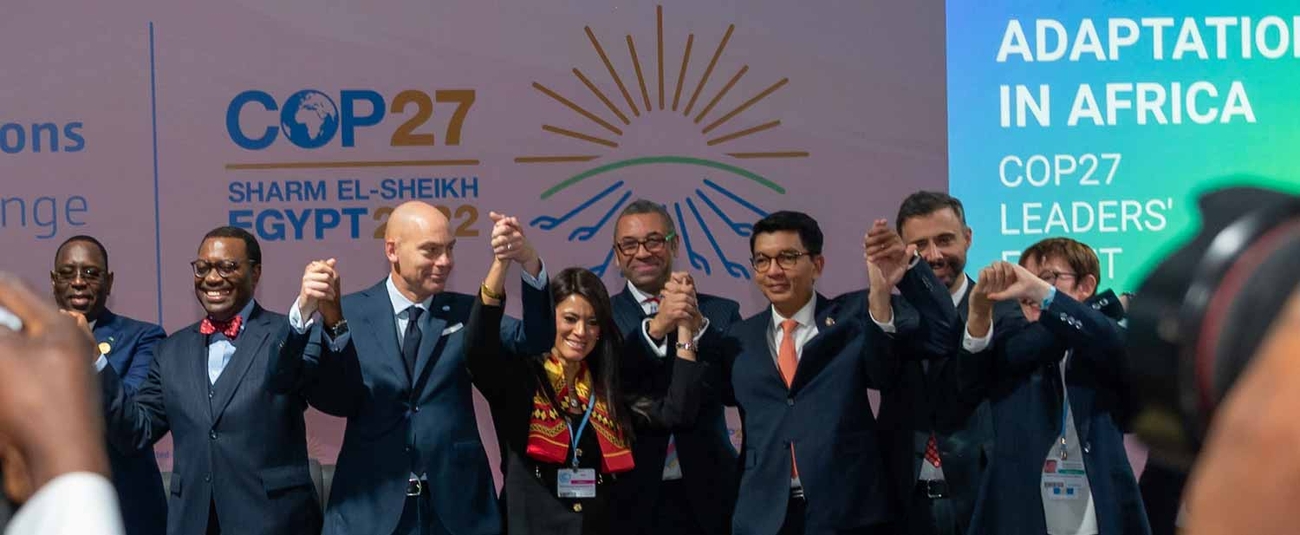
Global leaders on Tuesday rallied around climate adaptation for Africa. They attended the Africa Adaptation Leaders’ Event, convened by African Union Chair President Macky Sall of Senegal, Global Center on Adaptation CEO Patrick Verkooijen, and African Development Bank Group President Akinwumi Adesina.
The event took place at the global climate summit (COP27) in Sharm El-Sheikh, Egypt. It underscored the critical need for climate adaptation in Africa and responded to the call for the capitalization of the Africa Adaptation Acceleration Program (AAAP).
“This is a pivotal step in the fight against climate change,” African Union Chair President Macky Sall said. “The commitments made by Africa’s partners will give the Africa Adaptation Acceleration Program the boost that it needs to transform the development trajectory of the world’s most climate exposed continent. I am confident in the ability of the AAAP to deliver results for Africa.”
The Africa Adaptation Acceleration Program is an Africa-owned and Africa-led initiative developed by the Global Center on Adaptation (GCA) and the African Development Bank (AfDB) in close collaboration with the African Union. It serves as the implementation of the Africa Adaptation Initiative (AAI) to mobilize $25 billion to implement, scale and accelerate climate adaptation across the Africa. Since 2021, AAAP has mainstreamed climate adaptation in over$3.5 billion of investments in 19 countries.
United Nations Secretary-General António Guterres said: “I want to express my total solidarity for the Africa Adaptation Acceleration Program […] I urge the international community to support Africa to mobilize the technical & financial resources for scaling up transformative adaptation.”
“With this innovative program, Africa has developed a plan to grow, create jobs and opportunities for people, and to be resilient against the climate crisis,” said President Akufo-Addo of Ghana. “AAAP’s singular focus on the issue of climate adaptation will also contribute to greater stability and progress in Africa and around the world. AAAP is aligned with Ghana’s plans to address climate change as it chairs the Climate Vulnerability Forum (CVF) to lead efforts from the world’s most climate vulnerable countries to spur and mobilize investment through the Climate Prosperity Plans."
James Cleverly, Secretary of State for Foreign, Commonwealth and Development Affairs of the United Kingdom announced that the UK will provide £200 million to the African Development Bank’s Climate Action Window. This is in addition to the £20 million announced at COP26 in Glasgow to the AAAP Upstream Financing Facility.
Cleverly noted: “Climate change is having a devastating impact on countries in Sub-Saharan Africa facing drought and extreme weather patterns, which have historically received a tiny proportion of climate finance. This new mechanism […] will see vital funds delivered to those most affected by the impacts of climate change, much more quickly.”
Prime Minister Mark Rutte of the Netherlands followed through on the commitment made at the Africa Adaptation Summit held at the Global Center on Adaptation in September to confirm that the Netherlands will contribute EUR110 million to the AAAP, with EUR10 million in support for the Upstream Financing Facility hosted by GCA and EUR 100 million for the Climate Action Window of the African Development Fund at the African Development Bank as part of the Netherlands’ commitment to dedicate half of its climate funding, fully grant based, to climate adaptation, with a focus on Africa.
Norwegian Prime Minister Jonas Gahr Støre echoed African leaders’ calls for countries to rapidly scale up finance for climate adaptation, stating: “The climate crisis is here and now. Years of progress are at risk.”
“The AAAP Upstream Financing Facility is the delivery mechanism of adaptation and will use millions to leverage the billions that is required for adaptation,” he continued. “AAAP projects will generate effective climate adaptation outcomes. Adaptation is a growth agenda. A jobs agenda. And a prosperity agenda. On behalf of Norway, I am looking forward to continuing this partnership, investing in it, and supporting it with the Global Center on Adaptation.”
International Monetary Fund Managing Director Kristalina Georgieva emphasized the need to accelerate adaptation in Africa, stating: “It is paramount to support Africa’s adaptation because Africa will not reach its tremendous potential without it. AAAP complements the IMF’s Resilience and Sustainability Trust, which helps countries address external shocks such as climate change and ensure sustainable growth that can give Africa a chance to leapfrog outdated development models.”
African Development Bank Group President Dr. Akinwumi Adesina said: “Africa is suffering from the devastating effects of climate change. Our continent is being short changed by climate finance. The contributions towards the Africa Adaptation Acceleration Program’s Upstream Financing Facility and the Climate Action Window – which the African Development Bank manages – will help capitalize the program. With increased capital, we can better deliver the investment needed to bridge the adaptation finance gap. We want to ensure that the most vulnerable communities can benefit from a sustainable and prosperous future.”
Endorsing the outcomes of the high-level meeting, Patrick Verkooijen, CEO of the Global Center on Adaptation, closed with a statement emphasizing the AAAP’s impact to date, noting that “there is no pause button on the climate crisis. Africa must adapt to the threat of climate change, and it must adapt now.”
“Through the AAAP,” he continued, “Africa has charted its path towards a climate-resilient future for its youth, its economic growth, and for its prosperity.”
About the Global Center on Adaptation
The Global Center on Adaptation (GCA) is an international organization which works as a solutions broker to accelerate action and support for adaptation solutions, from the international to the local, in partnership with the public and private sector, to ensure we learn from each other and work together for a climate-resilient future. Founded in 2018, GCA is hosted by the Netherlands, working from its headquarters in Rotterdam with a knowledge and research hub based in Groningen. GCA has a worldwide network of regional offices in Abidjan, Côte d’Ivoire, Dhaka, Bangladesh and Beijing, China. Through this evolving network of offices and global and regional GCA teams, the organization engages in high-level policy activities, new research contributions, communications, and technical assistance to governments and the private sector.
About the African Development Bank
The African Development Bank Group is Africa’s premier development organization. Its overarching objective is to spur sustainable economic development and social progress in its regional member countries, thus contributing to poverty reduction across the continent.
The Bank Group achieves this objective by mobilizing and allocating resources for investment in African countries and providing policy advice and technical assistance to support development efforts.
In 2015, all multilateral development institutions agreed on the same set of objectives, the United Nations Sustainable Development Goals.
Learn more: https://www.afdb.org/
About the Africa Adaptation Acceleration Program
The Africa Adaptation Acceleration Program (AAAP) is a joint initiative of the African Development Bank and the Global Center on Adaptation (GCA). It aims to mobilize $25 billion, over five years, to accelerate and scale climate adaptation action across the continent. This ambition is delivered through the AAAP Upstream Financing Facility managed by the Global Center on Adaptation and the African Development Bank’s climate action window in the ADF replenishment. AAAP works across four pillars to achieve transformational results: Climate-Smart Digital Technologies for Agriculture and Food Security; African Infrastructure Resilience Accelerator; Youth Empowerment for Entrepreneurship and Job Creation in Climate Adaptation and Resilience and Innovative Financial Initiatives for Africa. AAAP has already guided over $3.5 billion of upstream investments in 19 countries with every dollar spent influencing $100 downstream.
COP27 - COP27 Leaders' Event, Accelerating Adaptation in Africa (DAY 2)
African and other global leaders meeting in Rotterdam say the continent is at a tipping point for climate adaptation action
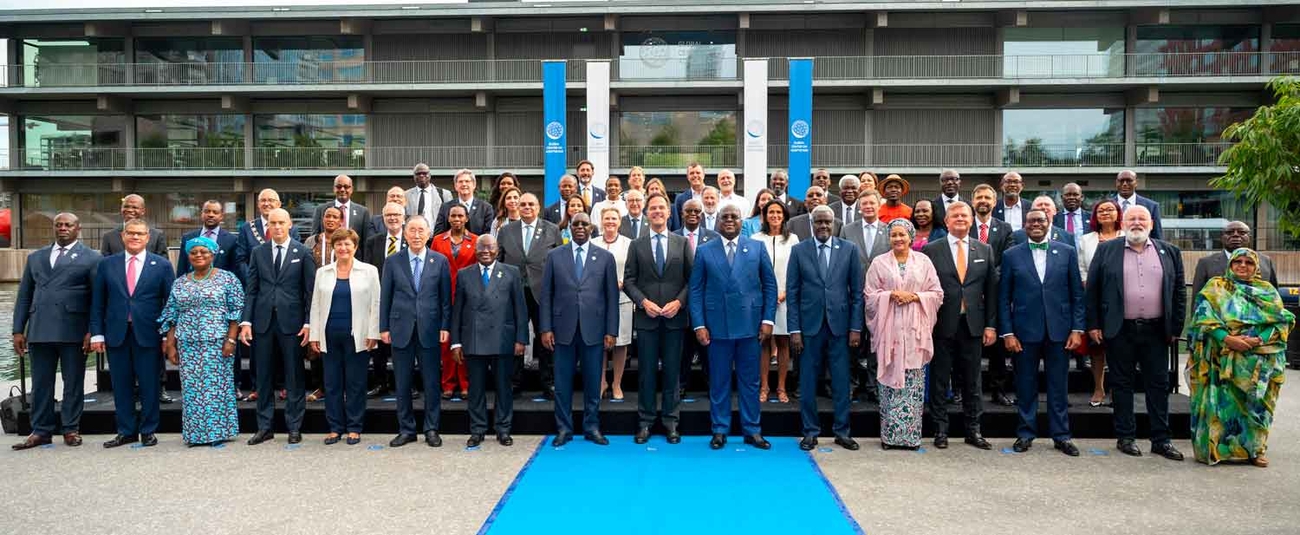
Two months to the 27th global climate summit (COP27) in Sharm El-Sheik, Egypt, African and other global leaders have rallied in Rotterdam, to highlight the urgency of climate adaptation funding for the continent.
The meetings—co-convened by the President of the African Development Bank Group Dr Akinwumi Adesina, CEO of the Global Center on Adaptation (GCA) Professor Patrick Verkooijen, and African Union Commission Chair Mousa Faki Mahamat—was unanimous about the need for concrete action and finance.
Former UN Secretary General Ban Ki-moon and GCA Co-Chair said: “The world has a fever. It burns hotter and higher with every day that passes… Statistics tell us that Africa is where the fever is at its most intense and people at the most vulnerable.”
GCA Co-Chair and Honorary Chairman of Royal DSM Feike Sijbesma spoke about the importance of support from the global private sector. He said 80% of the funding for adaptation needs to come from the private sector in both the developed north and the developing south.
GCA Chief Executive Officer Patrick Verkooijen emphasized the disastrous impacts of climate change hitting all parts of the world. He said it is in Africa, however, that climate shocks will hit the hardest. He said Africa was resolute about its economic advancement and would not stop. “Adaptation in Africa is like climbing a mountain. With all of you here today, we have the dream team that will climb the mountain together.”
Verkooijen added: “The next summit after today is Sharm El-Sheikh, the Africa COP. But success in Egypt will hinge on whether Africa’s needs are met or not. Africa has the commitment and the plan. That plan is the Africa Adaptation Acceleration Program (AAA-P). It is Africa-developed and Africa-owned. It was launched by Africa’s leaders, who are here today. It is the vehicle for delivering the Africa Adaptation Initiative.”
Established in 2020 by the GCA and the African Development Bank, the Africa Adaptation Acceleration Program lies at the center of climate action on the African continent. Participants acknowledged Verkooijen’s and Adesina’s joint efforts as the driving forces behind the program.
African Union Chairperson, President Macky Sall of Senegal, President Nana Akufo-Addo of Ghana, who is Chair of the Climate Vulnerable Forum, and President Felix Tshisekedi of the Democratic of the Congo conveyed a unified message: the international community must deliver on its pledge to double adaptation finance and to scale adaptation action for Africa.
President Sall expressed disappointment at the absence of industrialized country leaders at the summit. The African Union Chair said if African leaders could be in Rotterdam in person to discuss such a crucial issue as climate adaptation in Africa, the very least they expected was that their European counterparts—whose countries are among the world’s biggest polluters—would also have been present at the summit.
This sentiment was shared by Presidents Akufo-Addo and Tshisekedi, African Union Commission Chairperson Moussa Faki Mahamat and UN Deputy Secretary General Amina Mohammed, among others. Mohammed said: “A bird only flies with two wings, and the representation at this table is lopsided.”
The UN deputy chief added that it was not Africa’s fault that it is in its current position, given that it contributes very little to global carbon emissions. She pondered on what the situation would have been if the roles had been reversed. Mohammed said the COP26 Glasgow pact was at risk of failing if the developed world did not make good on its promises of delivering $100 billion a year for climate action in developing countries.
In his intervention(link is external), Adesina reminded participants that the African continent was warming faster than any other region of the world, as predictions from the Intergovernmental Panel on Climate Change show that the critical global warming levels will be reached much earlier in Africa.
The African Development Bank chief explained that in the face of the deluge, Africa does not have the resources to tackle climate change. He said the continent receives only 3% of global climate financing. He noted that if this trend continued, Africa’s climate financing gap could reach between $100 billion to $127 billion per year through 2030.
Adesina said: “The current climate financing architecture is not meeting the needs of Africa. New estimates by the African Economic Outlook of the African Development Bank show that Africa will need between 1.3 and 1.6 trillion dollars from 2020 to 2030, or $118 billion to $145 billion annually to implement its commitments to the Paris Agreement and its nationally determined contributions.”
The African Development Bank chief said the African Adaptation Acceleration Program’s upstream facility at the GCA had already helped to generate $3 billion of mainstreamed climate adaptation investments by the African Development Bank, from agriculture to energy, transport, water, and sanitation.
Adesina spoke of the African Development Bank’s African Development Fund (ADF), its concessionary lending arm as one of the ways to address the climate financing gap. He said the 16th replenishment of the fund, currently underway, presented a unique opportunity for full financing of the $12.5 billion in financing for the Africa Adaptation Acceleration Program.
The African Development Bank chief explained that the African Development Fund had introduced a Climate Action Window that would hopefully mobilize $4 billion to $13 billion for climate adaptation for the Fund’s member countries. “This will be used to support 20 million farmers with access to climate resilient agricultural technologies, access of 20 million farmers and pastoralists to weather-indexed crop insurance, reviving 1 million hectares of degraded land, and provision of renewable energy for about 9.5 million people.
Adesina said commitments by developed countries to provide $100 billion annually in climate finance for developing countries was long overdue. “Africa cannot wait,” he emphasized. “This is the time to support the Africa Adaptation Acceleration Program. This is the time to support the ADF 16th replenishment. This is the time to support the Climate Action Window of ADF-16.”
World Trade Organization Director General Ngozi Okonjo-Iweala also lent her voice to the clarion call for additional resources for Africa adaptation funding. Speaking about the role of trade in climate adaptation, she said trade policies should be integrated into global climate action as an amplifying force for financing and other climate-related support provided to vulnerable economies.
The summit’s five-point Communique(link is external) highlighted that Africa was at a tipping point. It emphasized that success at COP27 will depend on whether the needs of Africa, the world’s most climate-vulnerable continent, are met with finance flowing into such key country-led adaptation programs as the Africa Adaptation Acceleration Program.
GCA Co-Chair Feike Sijbesma said in closing: “Investments in global climate adaptation cooperation are a big opportunity for countries like the Netherlands to share some of our best innovations with those who need them the most. The AAAP will be a crucial vehicle for triggering far greater business investment across Africa into green and resilient solutions. This is a collective effort, we need every sector, every contribution possible to see off the climate crisis in Africa, and the private sector, in particular, has a massive role to play.”
Millions pledged at Africa adaptation acceleration event
Rich nations pledge funds at Africa climate crisis summit
African leaders push to secure climate adaptation funding
African, other world leaders gather for largest summit on climate adaptation at COP26
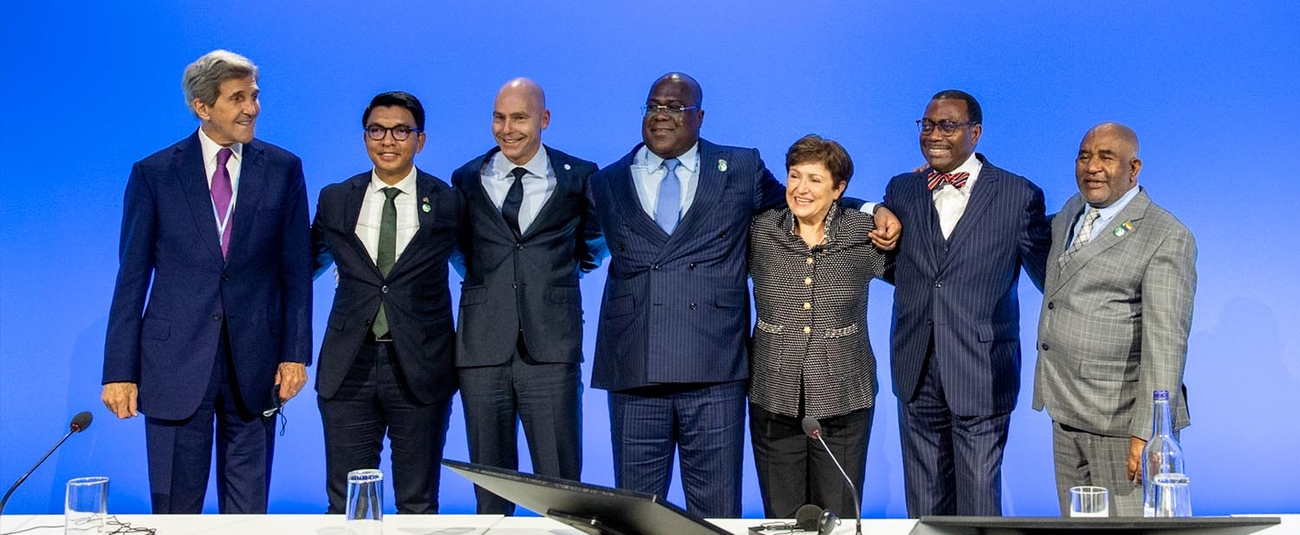
African and other global leaders came together at COP26 in Glasgow yesterday for the Africa Adaptation Acceleration Summit, the largest summit to date on climate adaptation.
The summit called for the rest of the world to ramp up its support for the African continent as it adapts to the adverse effects of climate change, including devastating human impacts in Madagascar, where 1.3 million people live under food distress following four years of no rain. Madagascar’s situation has been described as the first climate induced drought.
President Félix Tshisekedi of the Democratic Republic of Congo and Chairperson of the African Union led Tuesday’s event. He highlighted the $6 billion in financial commitments for climate adaptation that African countries had put forward in their nationally determined contributions (NDCs) and called for increased funding to produce the additional $27 billion a year that the continent requires.
President Tshisekedi said: “Adaptation finance flowing to Africa is grossly insufficient compared to the enormous resources needed for the continent to adapt to climate change. That is why African countries, working with the Global Center on Adaptation, the African Development Bank, and other partners, launched the Africa Adaptation Acceleration Program (AAAP). The program lies at the heart of Africa’s climate change needs. It is Africa-owned and Africa-led. African nations have endorsed it as Africa’s preferred mechanism to deploy adaptation finance for adaptation projects in Africa.”
African Development Bank Group President Dr Akinwumi A. Adesina said: “The Africa Adaptation Acceleration Program is a game changer for Africa to deliver results and impacts on adaptation, fast and at scale. It will support 30 million farmers with digital climate advisory services. The Technologies for African Agricultural Transformation program supported by the African Development Bank and the Bill and Melinda Gates Foundation has already delivered climate resilient technologies for 11.2 million farmers in just two years.”
He added: “With the Africa Adaptation Acceleration Program, we expect to reach 40 million farmers. We plan to support farmers in producing 100 million metric tons of food, which will be enough to feed 200 million people and reduce hunger by 80%.”
Moderating summit proceedings, Patrick Verkooijen, CEO of the Global Center on Adaptation, underscored the urgent need for accelerated climate adaptation action across the continent: “COP26 must deliver on the promises of Paris,” he said. “We are failing and we are failing Africa. We must bring more ambition and more finance to help Africa adapt to the pace of a climate emergency devastating the continent with increasingly serious consequences for the world’s poorest and most vulnerable,” the GCA CEO added.
COP26 President Alok Sharma announced $197 million in new funding for adaptation for Africa from the UK government. Of this amount, $27 million will support the Africa Adaptation Accelerated Program upstream facility to deliver technical assistance and a pipeline of bankable projects. The package is expected to unlock almost $1.2 billion for climate adaptation in Africa. Sharma said there will be more to come.
US Secretary of State Antony Blinken also announced new funding for climate adaptation from the United States government. He said the US President would work with the US Congress to dedicate $3 billion annually in adaptation finance by the year 2024. This is the largest commitment ever made by the US to reduce the impact of climate change in those most endangered by it around the world.
Put adaptation atop the climate change agenda, global leaders urge ahead of COP26. “We are in the eye of the storm.”
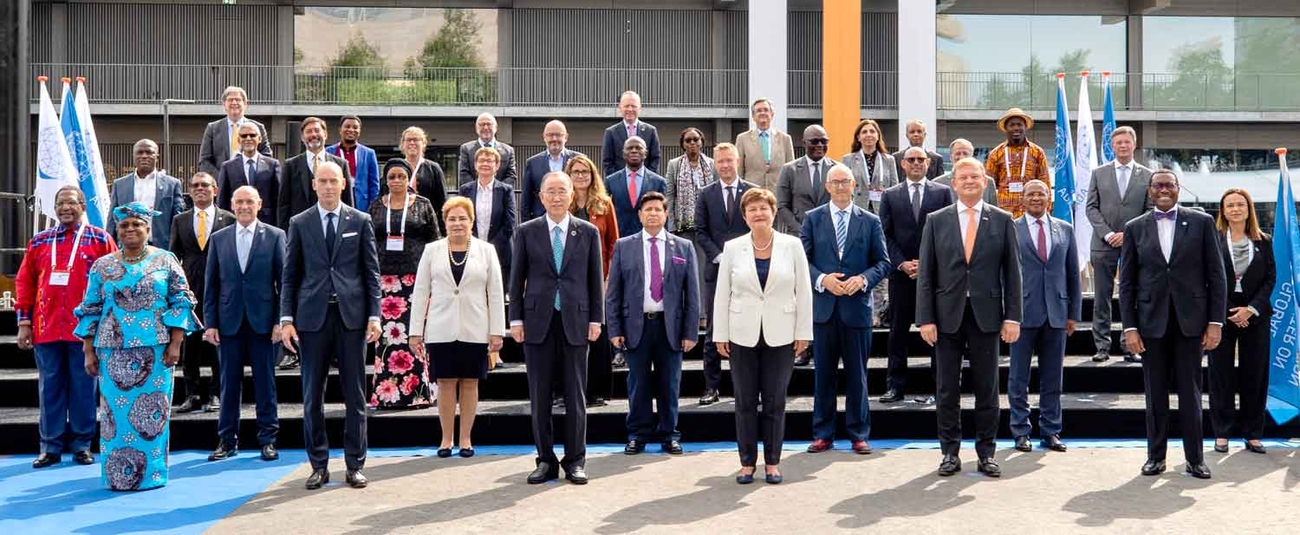
Global leaders stressed the critical urgency of climate adaptation when they came together in Rotterdam, the Netherlands, on Monday at a meeting of the Friends of the Global Center on Adaptation (GCA). The agenda was the acceleration of adaptation solutions ahead of November’s United Nations global climate summit, COP26.
The leaders underlined the imperative for all countries to step up climate adaptation initiatives while mitigating carbon emissions in the global effort to combat climate change. In the presence of H.R.H King Willem-Alexander of the Netherlands, the meeting was also the occasion to inaugurate the largest floating office in the world in Rotterdam’s Rijnhaven, which will serve as the headquarters of the Global Center on Adaptation.
More than fifty leaders from the international climate and development community impressed the need to forge a clear “adaptation acceleration imperative for COP26”. The meeting concluded with a communiqué(link is external) adopted in the presence of the Dialogue’s co-conveners, namely, Chair of the GCA Board, 8th UN Secretary-General Ban Ki-moon; CEO of the Global Center on Adaptation, Patrick Verkooijen; Managing Director of the International Monetary Fund (IMF), Kristalina Georgieva; and UN High-Level Climate Champion on Private Sector for COP26, Feike Sijbesma.
The participants, some of whom joined remotely, included President Felix Antoine Tshisekedi of the Democratic Republic of Congo and Chair of the African Union; Frans Timmermans, Executive Vice President, European Commission; Amina Mohammed, Deputy Secretary-General of the United Nations; Huang Runqiu, Minister of Environment and Ecology of the People’s Republic of China; and Dr. Akinwumi A. Adesina, President of the African Development Bank.
In August, the UN’s Intergovernmental Panel on Climate Change published its most comprehensive assessment report ever, issuing a somber warning that planetary heating could reach 1.5°C in the next decade, as climate impacts worsen.
Verkooijen stressed that adapting the world to the climate emergency was essential for world safety. “We are now living in the eye of the storm…From now on we are fighting a battle on two fronts: we have to fight to slash emissions while investing the same level of energy to adapt to a global climate emergency,” Verkooijen said.
While Africa is responsible for a mere 5% of global emissions, the continent bears a disproportionate negative impact of climate change. This includes changing rainfall patterns, droughts, floods, and other natural disasters. They affect agriculture and reduce food security. The leaders agreed that action on climate adaptation was even more urgent in the wake of the Covid-19 pandemic.
“We need the world to come together and be very specific...We should see this as a combination of opportunities that should mobilize us,” Timmermans said. “Adaptation and mitigation are two sides of the same coin.”
Addressing the financing aspects of climate adaptation, Adesina told participants that African countries had to make climate adaptation a key element of their recovery plans if they are to build back better from the Covid-19 pandemic.
He said: “The African Development Bank’s share of adaptation finance has increased from 49% in 2018 to 55% in 2019 and 63% in 2020. We are on track to mobilize the target of $25 billion between 2020 and 2025 to support investments that address climate change and promote green growth. Together, through the Africa Adaptation Acceleration Program, the African Development Bank and the Global Center on Adaptation will mobilize an additional $12.5 billion to galvanize and scale up climate-resilient actions through proven innovative solutions which address the Covid-19 pandemic, climate change, and the economy.
“In addition, the $650 billion issuance of the Special Drawing Rights (SDRs) by the IMF presents a unique opportunity to also provide some SDR resources to the multilateral development banks. The multilateral development banks can significantly leverage these SDRs several times and use their sector-wide knowledge and vast experience on policy-based operations to support countries to put in place policies that drive climate adaptation and resilience. This will complement the role of the IMF as it uses SDRs for macroeconomic stability.”
Also addressing financing, GCA Board Chair Ban Ki-moon said: “The goal of transferring $100 billion per year from wealthy countries to developing economies is yet to be met…The adaptation agenda is not sufficiently supported…Our task is to rebuild confidence and trust…We should be constantly seeking to raise ambition.”
The leaders underlined the three imperatives of the meeting – ambition, financing, and partnerships, all aimed at ensuring adaptation and mitigation in parallel.
President Felix Antoine Tshisekedi of the Democratic Republic of Congo and Chairperson of the African Union said: “Africa must not be left behind. Climate change affects all our development goals…Adaptation should be an essential part. We cannot eradicate hunger if we can only eat when it rains.”
Ngozi Okonjo-Iweala, Director-General of the World Trade Organization (WTO), shared new ideas for managing climate through mainstreaming trade as a means to support adaptation. “It is important to mainstream resilience into global trade to support economic diversification and green economy; the World Bank and IMF should come together with the WTO in a common approach along those lines.”
In her intervention, International Monetary Fund Managing Director Kristalina Georgieva, a co-convener of the meeting, spoke on the divergence between rich and poor countries; one of the new ideas she is proposing at the IMF is mandating the integration of climate adaptation in consultations with vulnerable countries. “Hard is not impossible. Adaptation needs to be put on equal footing with mitigation. Our big idea is to get the wealthy countries to on-lend for the big purpose of sustainability,” Georgieva said.


